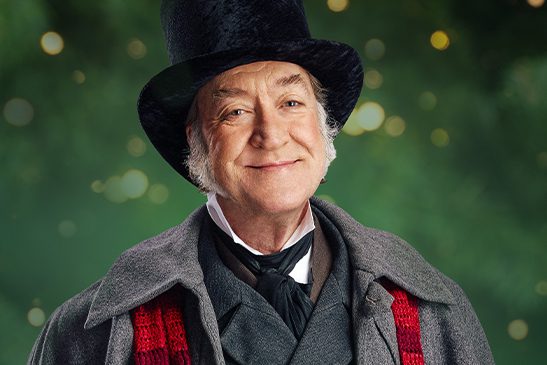
The Christmas spirit seems alive and well at the Goodman Theatre, where families sip hot chocolate, carolers sing in the lobby and people peruse an array of glittering nutcrackers in the gift shop. But the story on the stage has endured for nearly half a century not because it’s comforting, but because it’s radical — a blistering critique of a world that values money over humanity, wrapped in the glow of Christmas magic. It is Charles Dickens’ “A Christmas Carol.”
“A Christmas Carol” has played every holiday season at the Goodman for over 45 years, beginning its 2024 performances on Nov. 24. After all this time, it’s no longer just a play, but a tradition that unites generations — parents bring their children, who then grow up to bring their own.
But while the production’s legacy should be celebrated, its messages are particularly relevant in today’s world — a world where the wealth gap has widened grotesquely, and where some hoard unimaginable riches while others struggle to keep warm. Dickens’ tale is not just a story of personal redemption; it’s an indictment of greed and a reminder of the devastating cost of prioritizing profit over people.
Ebenezer Scrooge embodies a type all too familiar today: a bitter old miser of a man, hoarding wealth and power like Smaug from “The Hobbit.” Running Scrooge & Marley’s money-lending business years after the death of his business partner, Scrooge is, by every definition, a grinch — he dismisses human connection as a frivolity, barks at charity workers and even rations coal in the dead of winter to pad his profit margins. He’s a figure who’d fit right in today’s billionaire tech executives or health insurance CEOs, concerned with his bottom line over any effect his business has on actual human beings.
In the story, now familiar from countless film adaptations, children’s books and Scrooge McDuck cartoons, Scrooge is visited on Christmas eve by Marley’s tormented ghost, bound in supernatural chains forged by his own selfishness. Marley warns that Scrooge will be visited by three spirits — Christmas Past, Present and Future — who will offer him a chance to change.
From the hauntingly beautiful apparitions of the ghosts to the joyous final scenes where Scrooge reconnects with his humanity (“Spirit! I am not the man I was!”), the production showcases the transformative — and absolutely timeless — power of storytelling. The Ghost of Christmas Past revisits pivotal Christmases throughout Scrooge’s life: a warm holiday party, the joy of young love, and the heartbreak of prioritizing wealth over happiness. Christmas Present brings him to the modest home of Scrooge’s clerk, Bob Cratchit, where the family’s fragile hope and gratitude challenge Scrooge’s cynicism. And finally, Christmas Future shows Scrooge what he will be on Christmas days yet to come — a dead man for whom no one mourns. By the night’s end, Scrooge is indeed transformed — he dances across the stage amid delighted laughs from the audience, and his once-hardened heart seems to radiate warmth as he reaches out to those he had previously pushed away.
As the final curtain falls and the audience rises to applaud, this Goodman Theatre production feels as much like holiday escapism as a clarion call. In a world where wealth is worshiped and kindness is seen as weakness, our country’s plutocrats could benefit from seeing “A Christmas Carol” and being reminded that change isn’t just possible — it’s necessary.





















































Matt Boresi (UHigh Theater) • Dec 17, 2024 at 1:41 pm
I really appreciate this review. My young daughter has been a cast member in this production for the past two years, so I’ve seen the show many times – and every time I’m taken aback by how radical (or at least radical to a hyper-capitalist society like 21st century USA) Dickens’ message is – and how well the Goodman teases out that message. I haven’t had the courage to call a piece of 19th century writing and a big holiday show “radical” in conversation – but it’s true, and Light Dohrn demonstrated the courage to say so in this article. Well done.